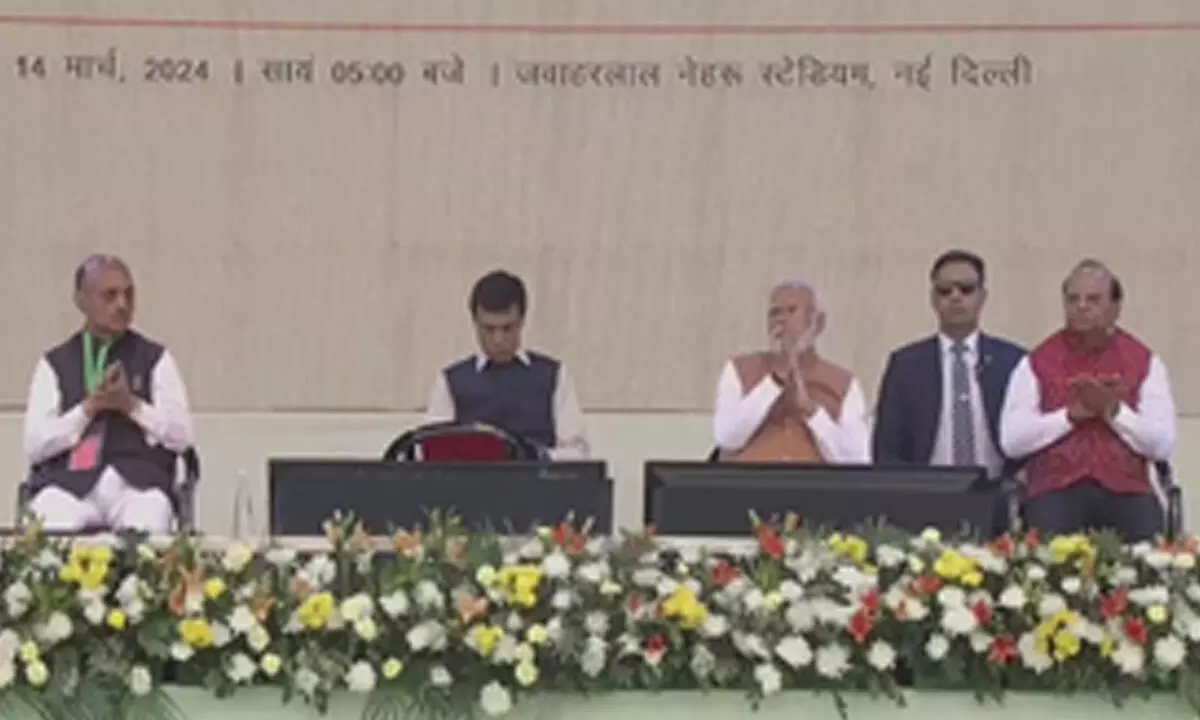Live
- IPL 2025 Auction: Shreyas Iyer sold to PBKS for record-breaking bid of Rs 26.75 cr
- Kyrgyzstan to ban vapes, electronic cigarettes
- How to maximise your EV's range: Tips and tricks for better longevity
- COP29 reaches global climate deal package
- Romanians vote in first round of presidential election
- Beijing braces for cold wave, rain, snow
- Gunman killed, three injured in shooting near Israeli embassy in Jordan
- BGT 2024-25: Bumrah, Siraj pick 3 wickets to put India on top after Jaiswal & Kohli smash tons
- Saira Rahman say stop tarnishing AR Rahman’s name ‘he’s a gem of a person’
- National Consumer Helpline gets 1,000 firms on board to fast-track resolution of complaints
Just In

Prime Minister Narendra Modi on Thursday laid the foundation stone of two additional corridors of Delhi Metro's Phase 4.
New Delhi: Prime Minister Narendra Modi on Thursday laid the foundation stone of two additional corridors of Delhi Metro's Phase 4.
The new corridors, connecting Inderlok to Indraprastha and Lajpat Nagar to Saket G-Block, will together be more than 20 km long and help improve connectivity and reduce traffic congestion.
"These two additional corridors, connecting Inderlok to Indraprastha and Lajpat Nagar to Saket G Block, are gifts for Delhi people. I congratulate all," the PM said.
During the event at the Jawaharlal Nehru Stadium, PM Modi also engaged with recipients of the PM SVANidhi scheme.
He expressed gratitude to street vendors, acknowledging their vital role in society, as was especially evident during the challenges of the Covid-19 pandemic.
Union Urban Development Minister Hardeep Singh Puri, who was also present, said that around 945 km of metro rail network is operational across the country.
"Around 65 to 70 lakh people travel in the Delhi Metro daily. These two corridors will be constructed at the cost of Rs 8,400 crore," he said, adding that around 2.5 lakh people will benefit from this daily.
"I thank PM Modi that you are dedicating the project to the people of Delhi and this is one more step towards PM Modi’s vision for 'Viksit Bharat'," Puri said.
The development of these corridors was cleared on Wednesday by the Union Cabinet chaired by the Prime Minister.
The Inderlok-Indraprastha corridor will be an extension of the Green Line and will provide interchange with the Red, Yellow, Airport Line, Magenta, Violet, and Blue Lines, while the Lajpat Nagar-Saket G Block corridor will connect the Silver, Magenta, Pink, and Violet Lines.
The Lajpat Nagar-Saket G Block corridor will be entirely elevated and will have eight stations -- Lajpat Nagar, Andrews Ganj, Greater Kailash-1, Chirag Delhi, Pushpa Bhawan, Saket District Centre, Pushp Vihar, and Saket G Block.
The Inderlok-Indraprastha corridor will have 11.35 km of underground lines and 1.03 km of elevated lines and comprise 10 stations -- Inderlok, Daya Basti, Sarai Rohilla, Ajmal Khan Park, Nabi Karim, New Delhi, LNJP Hospital, Delhi Gate, Delhi Sachivalaya, and Indraprastha.
It will provide enhanced connectivity to the Bahadurgarh region of Haryana as commuters from these areas can travel on the Green Line to directly reach Indraprastha and various other areas of central and east Delhi.
Eight new interchange stations will come up on these corridors at Inderlok, Nabi Karim, New Delhi, Delhi Gate, Indraprastha, Lajpat Nagar, Chirag Dilli, and Saket G Block, and significantly improve the interconnectivity among all the operational lines of the Delhi Metro network.
The Delhi Metro is already constructing a network of 65 km as part of its fourth phase. These new corridors are expected to be completed, in stages, by March 2026.
Presently, the DMRC operates a network of 391 km consisting of 286 stations. The Delhi Metro is now one of the fastest-growing Metro networks in the world.

© 2024 Hyderabad Media House Limited/The Hans India. All rights reserved. Powered by hocalwire.com






